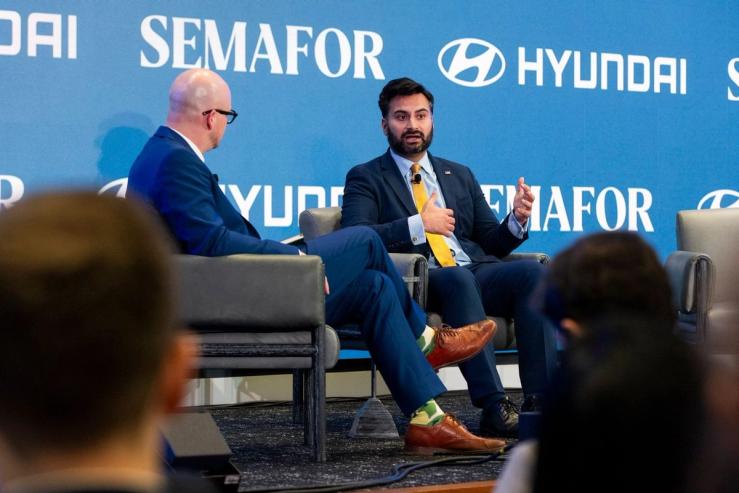The News
The U.S. needs to raise tariffs and other trade barriers against low-cost clean tech exports from China, even if doing so raises the price of solar panels and EVs for U.S. consumers, White House climate adviser Ali Zaidi said this week during Semafor’s World Economy Summit.
“It’s penny wise, pound foolish,” he said, to rely on China for U.S. energy transition hardware.
Zaidi also downplayed the risk that congressional Republicans, or a second-term President Donald Trump, would follow through on threats to repeal the Inflation Reduction Act, arguing that the law is shielded by its job creation potential.
Politicians from both parties “are right now flying off to their districts to cut ribbons at projects that were facilitated by the IRA,” he said. “As much as the political part of their brain would love to remain in denial about the massive economic opportunity here, reflexively, they probably get that investing in the American people and our industrial competitiveness is working, and turns out to be pretty good politics.”
In this article:
Tim’s view
One of the hardest needles for the Biden administration to thread on climate has been how to respond to clean tech competition from China. A deluge of cheap imported solar panels and EV batteries should be a good thing for U.S. emissions targets, and the solar installation industry has lobbied strenuously against the administration’s raising of protective trade barriers. Domestic manufacturing, on the other hand, creates jobs but raises prices, and so comes at the expense of clean tech adoption. But that conventional economic analysis overlooks the fact that the political advantages of domestic manufacturing may outweigh the cost disadvantages.
Tariffs and tax bonuses for local materials and production do lead to deeper emissions cuts, Zaidi said, because they help bind the U.S. economy to clean tech, and thereby make climate policy more durable. Domestic manufacturing also gives the U.S. a greater ability to leverage its own clean tech exports geopolitically. It’s not clear whether any of this will help Biden win reelection — new polling data indicates that only 19% of Americans think the IRA is helping the U.S. economy (while 34% don’t even know enough about it to have an opinion). And China’s manufacturing advantage is so huge that it will take an enormous, and risky, escalation in trade protectionism to make U.S. clean tech competitive. But allowing China to go unchallenged, Zaidi said, would be a grave mistake.
The View From the White House
This conversation has been edited for length and clarity.
Semafor: Elon Musk said recently that BYD stands to ‘pretty much demolish’ U.S. and European automakers on EVs unless we get more protectionist measures in place. That’s his view. How do you view competition with China on EVs?
Zaidi: Chinese trade practices have been on the receiving end of appropriate complaints. First, we need a very aggressive set of measures to level out the playing field when it comes to trade and climate. If we have that, I think we can be successful. So if you look at the embodied carbon emissions in certain products, the subsidies they get, and labor standards, there are a number of trade tools that are appropriate to effectively avoid a lot of the issues we’ve seen, including the concentration of manufacturing [in China] that makes supply chains brittle and vulnerable. Tariffs are one part of a robust trade posture that the U.S. and frankly our allies and partners need to be pursuing.
If we throw our hands up and resign ourselves to being behind the curve on the proliferation of next-generation technologies, that’s a great risk. We’ve got to reinvest in American innovation. And this is where I really get frustrated by some of the policy discourse in Washington. To drive the U.S. to the front of the global competition, we need a strong and sustained deployment trajectory here. Countries that have had both a strong deployment policy linked to a strong set of incentives for manufacturing are those that were successful. That’s how you build a virtuous cycle. And we got to keep after both of these things, we can’t take our eyes off the prize.
Semafor: So you don’t think it’s better, from an emissions perspective, to just import all the super cheap batteries and solar panels and stuff from China?
Zaidi: We’ve had experiments with that approach in other jurisdictions. The Europeans now are in a very different position [than the U.S.] on EVs, and probably have consigned their customers to limitations in the choices they’ll have in the future. We were very aggressive about making sure that in the U.S. you had the choice to buy from Ford or GM or the other companies that people are accustomed to. Consumer choice is an essential piece.
And if we go down this road of buying our emissions reductions on the cheap today, you’re hosed tomorrow. We saw that with semiconductors. And on the climate journey, we can’t afford to slow down, and we can’t move the ladder up from behind us. We’ve got to bring this transformation to the global south. To do that, for America to be the leader, not investing in our industrial capacity is the absolute wrong playbook.
Semafor: Is that how you feel as well about critical mineral mining? Shouldn’t the U.S. be doing more of that domestically?
Zaidi: We’ve got to source domestically, and we’ve got to source from our friends, we’ve got to expand the supply chain and diversify it. But I do think there’s a false choice sometimes presented, which is that we’re either going to miss this or it’s got to be destructive and dirty and a race to the bottom. There’s a difference between going to the Salton Sea, where we’re already extracting geothermal energy, and harnessing lithium from that brine at the same time, versus going to a pristine national park and saying we must get the resources from this place. Some folks might disagree but ESG still matters, whether you like that label or not. That is our road ahead if we want to stay on the trajectory to establish the U.S. as a leader.
Semafor: What’s on the docket for climate in a second Biden term?
Zaidi: Cutting our emissions 50-52% by 2030 is truly unprecedented, and in going through that process, we’re learning a lot about bottlenecks and constraints. And on the other side of dealing with those is a whole pot of cash and jobs for your district. So I do think folks will finally get together and pass efforts to accelerate the build-out of [electricity] transmission, to finally fund a massive build-out of our industrial capability to produce things like transformers and HVDC cables here in the U.S.
There’s a lot to do to finish the job. Now I think we can look at places that felt very hard to do before. The industrial sector, steel, cement, aluminum, there’s going to be a market for the next several decades in clean production of construction materials. We can be the pioneers for that here in the U.S. There’s a massive additional opportunity in the land sector. And the voluntary carbon market, which is still esoteric for a lot of people, is going to become more mainstream, and the country that’s out front on building the tech platforms for measurement, monitoring, and verification is going to be the country that leads that transformation.
Notable
- U.S. climate envoy John Podesta made a similar argument to Zaidi this week in remarks at Columbia University: “Existing trade policies and the international rules that govern them,” he said, “don’t pay enough attention to the emissions embodied in tradeable goods.”


